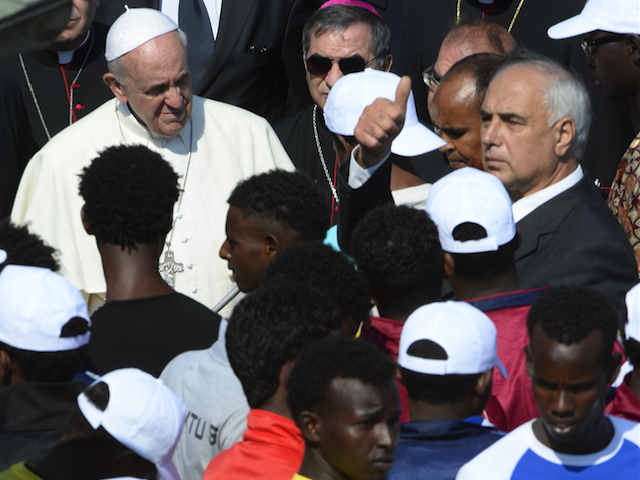In a new message for the World Day of Migrants and Refugees Pope Francis has called for “broader options for migrants and refugees to enter destination countries safely and legally.”
In his message for 2018, released today from the Vatican, the Pope outlined his vision for an international approach to the migrant crisis with a four-point program: “to welcome, to protect, to promote and to integrate.”
Among his concrete suggestions for welcoming migrants, Francis calls for an increase and simplification of the process for granting humanitarian visas and for reunifying families. He also expresses his hope that more countries will adopt “private and community sponsorship programmes,” and open “humanitarian corridors for particularly vulnerable refugees.”
The duty to protect migrants, the Pope says, means defending “the rights and dignity of migrants and refugees, independent of their legal status.”
This protection entails “adequate consular assistance, the right to personally retain their documents of identification at all times, fair access to justice, the possibility of opening a personal bank account, and a minimum sufficient to live on,” he states.
Underage migrants, he says, “must be spared any form of detention related to migratory status, and must be guaranteed regular access to primary and secondary education.”
Promoting, on the other hand, essentially means “a determined effort to ensure that all migrants and refugees – as well as the communities which welcome them – are empowered to achieve their potential as human beings,” Francis asserts.
In a more controversial statement, Francis suggests that all migrants, “including those seeking asylum” should be given “the possibility of employment, language instruction and active citizenship, together with sufficient information provided in their mother tongue.”
Integrating, the fourth principle in the Pope’s program, means becoming one with the new society in which a person is residing, but is not “an assimilation that would lead migrants to suppress their own cultural identity.”
In the past, Francis has suggested that this principle means that nations should not take in more migrants than they can reasonably assimilate—which includes housing, education and employment.
Last year, while praising Sweden’s history of welcoming migrants, he warned that integration is absolutely essential.
“What is the danger when a refugee or migrant is not integrated?” Francis asked. “He is ghettoized, that is, he enters a ghetto. And a culture that does not develop in relation with another culture, that is dangerous,” he said.
“I think that in theory no one should close their heart to a refugee, but those who govern must also exercise prudence. They should be very open to receiving them, but they should also calculate how they will be able to settle them, because a refugee must not only be welcomed, but also integrated.”
“And if a country is only able to integrate 20, let’s say, then it should only accept that many. If another is able to do more, let it do more,” he said.
By the Pope’s criteria, the United States finds itself among the most generous nations in the world regarding immigration.
According to the most recent data, the U.S. takes in an average of over one million legal immigrants each year. In 2015, for instance, 1.38 million foreign-born individuals moved to the United States, which represented a 2 percent increase from 1.36 million in 2014.
Immigrants make up over 10 percent of the U.S. population and in 2015 numbered more than 43.3 million, or 13.5 percent, of the total population of 321.4 million, according to American Community Survey (ACS) data.
According to the 2016 Current Population Survey (CPS), immigrants together with their U.S.-born children now number approximately 84.3 million people, or 27 percent of the total U.S. population.
Follow Thomas D. Williams on Twitter Follow @tdwilliamsrome

COMMENTS
Please let us know if you're having issues with commenting.